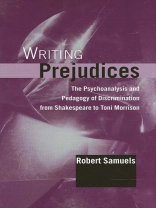Examines the manifestations of racism, sexism, and homophobia in the literary works of Shakespeare, Mary Shelley, Joseph Conrad, and Toni Morrison.
Writing Prejudices addresses critical attempts to undermine prejudice through education in general, and literary studies in particular. Robert Samuels argues that these attempts often fail because they do not take into account the different forms of prejudice, the role played by homophobia in racism and sexism, the structure of what Lacan calls symbolic castration, and the unconscious foundations of cultural formations. Addressing these deficiencies, Samuels uses psychoanalytic theory to examine the manifestations of racism, sexism, ethnocentrism, and homophobia in the works of Shakespeare, Mary Shelley, Joseph Conrad, and Toni Morrison, showing how these distinct modes of oppression feed off of each other and the diverse ways that cultural critics can work to undermine them.
สารบัญ
Acknowledgments
1. Introduction
PART ONE: Early Modern Prejudice
2. Racism, Sexism, and Homophobia in Othello
3. The Cycle of Prejudice in Shakespeare’s Miscegenating Sonnets
4. The Tempest: Colonial Desire, Homophobic Racism, and the Ideological Structures of Prejudice
PART TWO: Colonialism, Slavery, and Racist Homophobia
5. Frankenstein’s Homosocial Colonial Desire
6. The Heart of Darkness and Homophobic Colonial Desire
PART THREE: Postmodern Prejudices
7. Internalized Racism and the Structures of Prejudice in The Bluest Eye
8. Beloved: Psychoanalytic Cultural Criticism and the National Unconscious
9. Conclusion
Notes
Works Cited
Index
เกี่ยวกับผู้แต่ง
Robert Samuels is Lecturer in the Writing Program at the University of California at Santa Barbara and the author of Hitchcock’s Bi-Textuality: Lacan, Feminisms, and Queer Theory, also published by SUNY Press.












